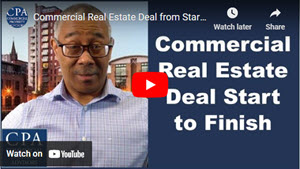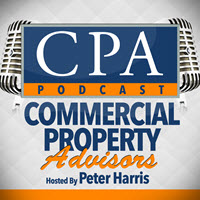
Is it better to go into debt to invest in commercial real estate or to live completely debt-free? Which financial strategy is best for you? Both can be beneficial, however using borrowed capital to invest in commercial real estate rather than being debt free can create more opportunities to build wealth, enabling you to use less to achieve more.
Benefits of Going into Debt to Invest in Commercial Real Estate
- You can use borrowed capital to invest in commercial real estate; the bank lending up to 75% of the property and you providing a 25% down payment.
- Your money is at work because you are leveraging the bank’s money to buy the property.
- You are producing wealth by creating cashflow and building equity. As the tenants pay rent, you pay your mortgage and expenses and pocket the remaining cashflow. Every time you pay down the loan, you’re shrinking the debt and creating equity in the property.
- If done correctly, commercial real estate investing has great tax advantages.
- The power to create income growth and equity over time.
Benefits of a Debt Free Personal Finance Strategy
- You’re not indebted to anyone for anything.
- Your cost of living is reduced because you are not paying off debt.
- You can build up your savings because your cost of living is reduced.
- For some people, no debt means less stress.
Commercial Real Estate Investing vs Debt-Free Investing
The two finance strategies below both start out with $400,000. In Strategy #1 we are buying four properties and in Strategy #2 we are purchasing one property.
Finance Strategy #1: Commercial Investing Using Leverage
This strategy uses leverage to invest in commercial real estate.
We are purchasing four 5-Unit buildings for $400,000 each. We can buy four because we are leveraging the bank’s money to buy the properties, applying a 25% down payment which is $100,000/property.
This gives our commercial real estate portfolio the value of $1.6 million. Our equity is still $400,000 at this point, however because we used borrowed capital to buy four properties, the portfolio value is $1.6 million.
Building Equity
We purchased each property for $400,000, with a down payment of $100,000, which means we owed $300,000 per property. Over the next 15 years we paid off half so now we owe $150,000. If we predict that over those fifteen years, each of the properties is now worth $700,000 and you owe $150,000 that means you have equity of $550,000 per property. With four properties in our portfolio, that means our equity now is $2.2 million. Our net worth is now $2.2 million.
What choices can we make by using this investment strategy?
The first choice to make note of is that we can use our equity to buy more property and increase our portfolio. One of my favorite exit strategies is the cash-out refinance. If the properties are worth $2.2 million, we can borrow 75% of that, pay off the mortgages and we’ll be able to cash out and pull out $1.5 million and use it to invest in more properties. This strategy also gives you options when looking for legal tax loopholes. For example, the $1.5 million we pulled out is tax free until we sell the property. I have a video called Tax Benefits of Commercial Real Estate Investing, where I detail the numerous tax benefits of investing using this investment strategy.
This strategy also provides enough wealth for you to retire comfortably and gives you the ability to pass down a legacy to your kids. Along with giving them the property, you are teaching them how to invest, run the numbers, be responsible property owners and good stewards. You are teaching them how to fish as opposed to just giving them fish.
Finance Strategy #2: Debt-Free Commercial Investing
We have purchased one 5-Unit building for $400,000, paid in full, with cash so we own one hundred percent of the property. The building provides a cashflow of $2000/month. Because we have no mortgage payment, the income minus our expenses equals our cashflow.
Building Equity
Having a long-term outlook and being conservative in my predictions, I calculate the property is worth $700,000 over fifteen years. We bought it for $400,000 and now our equity and net worth is $700,000.
What choices can we make by using a debt-free investment strategy?
Our choices are limited because we want to remain debt-free. Are we able to retire? Even if the cashflow increases to $3,000/month over fifteen years, it’s not likely. Not only does this strategy not produce enough wealth to retire, it also has very few legal tax-advantages. Another thing to consider is that when you pass this down to your kids what are you teaching them? They’re not learning anything from this except how to be debt free. You are giving them fish, but not teaching them how to fish.
A Few Points About Debt:
Risky Debt: You may have heard it said that debt is risky during hard times and it can be. However, I’ve used these precautions for 20 years investing in commercial real estate, and it’s what I teach my students.
- Have cash reserves: When you buy a property make sure it’s not your last dollar.
- Don’t leverage more than 90% long-term: You may be able to get into a loan with 10% down but make sure it’s for a shorter time, not a 10 or 15-year loan because the market is going to fluctuate. Make sure it’s shorter so that when times are tough you can get out of it.
- Be a good operator: Learn how to manage the property properly, keep track of expenses, do your accounting. Also, you need to learn how to manage the management company and if you have a property manager hold that person accountable.
Short Term Debt: Don’t do short term debt on real estate investing. Let’s face it, the Coronavirus has made people with short term debt nervous because with their loans coming due, they may not be able to refinance. Instead, I suggest you do 7, 10 ,15 year, even a 30-year loan. Thirty-year fixed loans are available for apartment buildings and it’s probably the safest thing you can do at the moment.
Paying Off Investment Loans: Although I don’t recommend it, you may want to pay off your commercial real estate loan if you are stuck in a terrible deal. What’s the solution to having a rotten deal? Don’t do bad deals.
Debt can be an amazing asset to building wealth. On the other hand, debt-free investing, in my opinion could be economically irresponsible, especially if you have the money and the expertise to leverage that money and create more wealth.
Conclusion:
If you are sitting on money and are stuck making decisions for whatever reason, read my post called 5 Keys to Making Decisions in Commercial Real Estate where I do my best to cover all of the fears and unknowns that can keep you from building wealth investing in commercial real estate.



